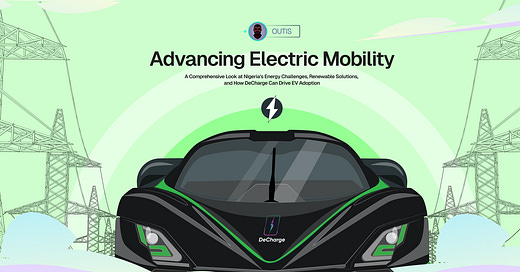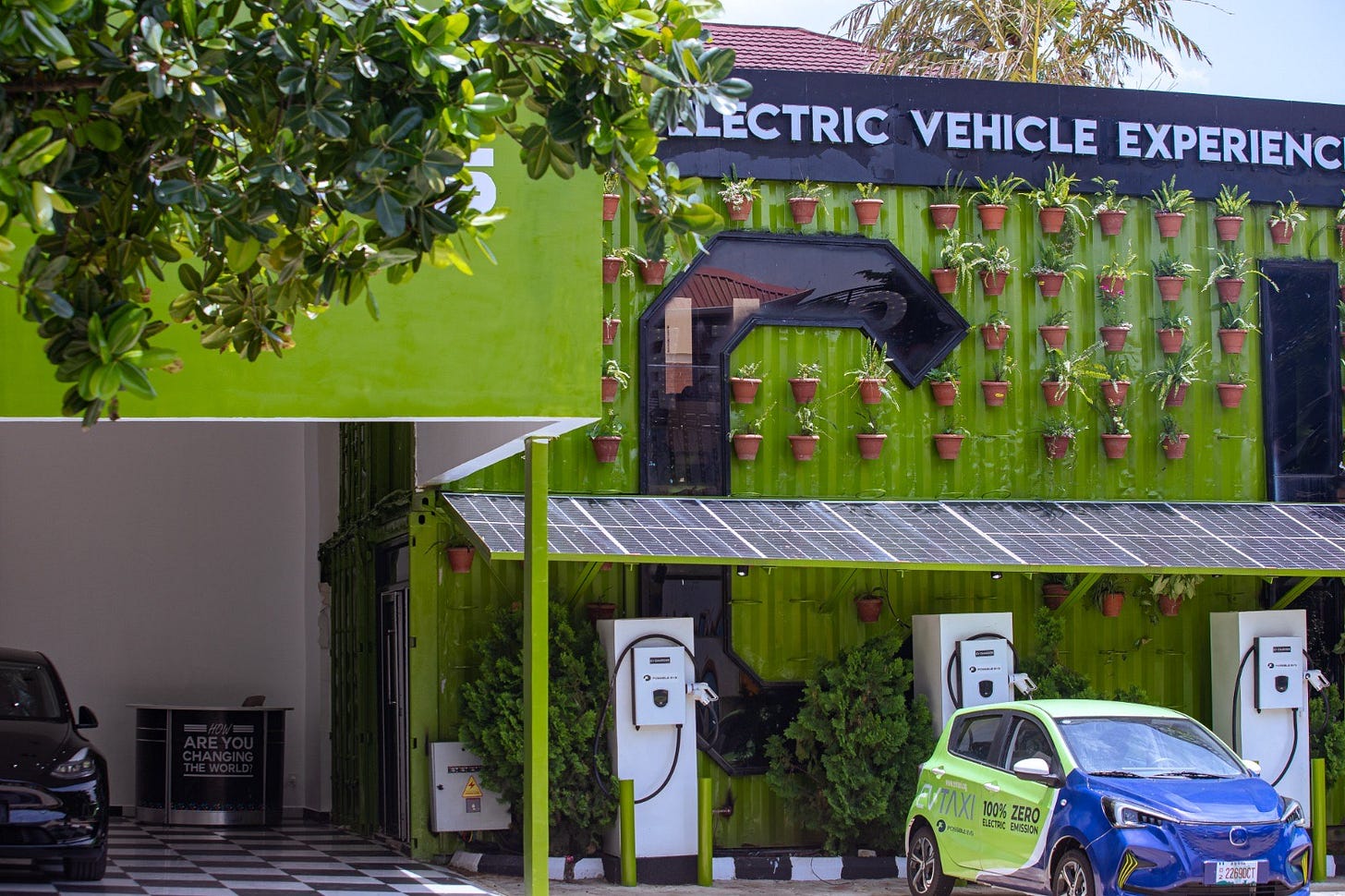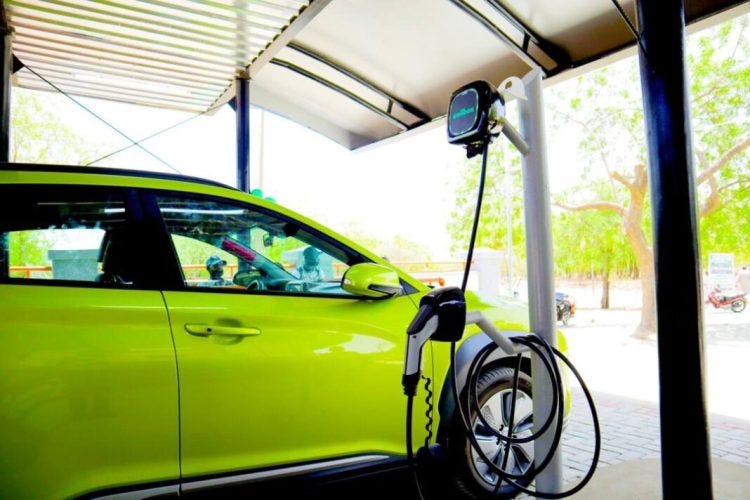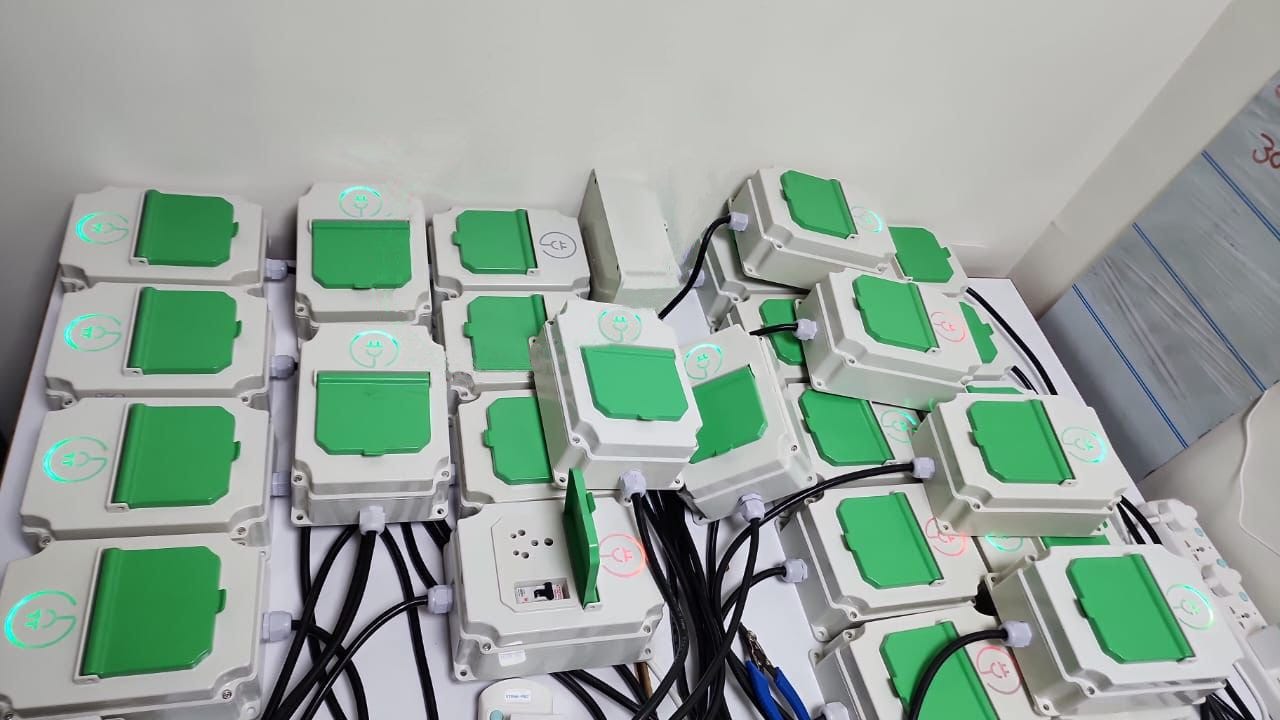Advancing Electric Mobility
A Comprehensive Look at Nigeria's Energy Challenges, Renewable Solutions, and How DeCharge Can Drive EV Adoption
Nigeria, the most populous country in Africa, has been grappling with significant energy challenges for decades. Despite being rich in natural resources like oil, gas, and renewable energy potential, the country struggles with inadequate power supply, leading to widespread energy poverty. With a growing population and increasing demand for energy, Nigeria faces a pressing need to transition towards more sustainable and reliable energy solutions. Globally, the shift towards electric vehicles (EVs) and renewable energy is gaining momentum, presenting a unique opportunity for Nigeria to address its energy woes while embracing the future of mobility and energy storage.
The State of Energy in Nigeria
Nigeria's energy sector is characterized by a paradox: while the country has abundant natural resources, it suffers from severe energy shortages. Over 140 million Nigerians, about 71% of the population, lack access to reliable electricity. This energy deficit has far-reaching implications on health, education, and economic development.
The energy sector in Nigeria heavily relies on fossil fuels, particularly oil and gas, which account for the majority of the country's energy production. Hydropower, the primary source of renewable energy, contributes to a smaller portion of the energy mix.
Energy Infrastructure
Nigeria has an installed capacity of about 13,000 MW, but only 4,000 MW to 7,000 MW is typically available due to various inefficiencies.
The transmission network is plagued by inadequate infrastructure and frequent breakdowns, resulting in significant power losses and unreliable electricity supply.
Distribution companies (DisCos) struggle with high levels of technical and commercial losses, poor metering, and low revenue collection rates.
A large portion of the population relies on expensive and polluting diesel generators for electricity. This not only increases the cost of energy but also has severe environmental and health impacts.
The energy sector faces regulatory uncertainties and financial constraints, hindering the development of new projects. However, recent legislative changes, such as the Electricity Act of 2023, aim to address some of these issues by decentralizing the electricity market.
Energy Consumption and Demand
Nigeria's energy consumption patterns reflect its economic activities and population distribution. The industrial and residential sectors are the largest consumers of electricity.
Industries, particularly manufacturing, consume a significant portion of the electricity supply. However, frequent power outages force many businesses to rely on expensive and polluting diesel generators.
The residential sector also accounts for a large share of electricity consumption, with urban households using more electricity compared to rural ones.
Opportunities for Electric Energy Storage in Nigeria
Energy storage is crucial for addressing power reliability issues and supporting the integration of renewable energy sources. Nigeria's frequent power outages necessitate reliable energy storage solutions to ensure continuous power supply.
Currently, Nigeria's energy storage solutions are limited. Existing implementations include battery storage systems for renewable energy projects and small-scale off-grid solutions. Successful case studies, such as solar mini-grids with battery storage, demonstrate the potential of energy storage to improve power reliability in rural areas.
Market Potential
The market demand for energy storage solutions in Nigeria is significant. With the government's push for renewable energy integration, the potential economic and environmental benefits are substantial. Scaling rural electrification through distributed solar generation and mini-grids could generate $9.2 billion in annual market investments and save Nigerian households and companies $4.4 billion annually.
Renewable Energy Potential
Nigeria has significant renewable energy potential, particularly in solar and biomass. The country's geographical location provides ample solar radiation, making it ideal for solar power projects. Additionally, biomass from agricultural residues and waste can be used for power generation.
Recent Developments
Recent developments in the Nigerian energy sector include the implementation of mini-grid regulations, support for decentralized energy solutions, and increased investments in renewable energy. The World Bank's $1.5 billion financing for Nigeria’s energy transition is a significant boost, aiming to improve energy access and support renewable energy projects.
State of Rechargeable Devices in Nigeria
Nigeria's market for rechargeable devices, including power banks, solar-powered systems, and rechargeable household appliances, is expanding rapidly. This growth is driven by frequent power outages and the need for reliable backup power solutions.
Market Overview
Solar home systems are increasingly popular, particularly in rural areas where grid electricity is unavailable. These systems provide reliable power for lighting, charging devices, and powering small appliances.
The demand for power banks and rechargeable batteries is high due to frequent power outages. These devices provide essential backup power for mobile phones and other small electronics.
Rechargeable household appliances, such as fans and lights, are widely used in both urban and rural areas. These appliances offer a cost-effective solution to power interruptions.
The State of Electric Vehicles (EVs) in Nigeria
An Electric Vehicle (EV) is powered entirely or partially by electricity, rather than using traditional internal combustion engines (ICE) that run on gasoline or diesel. The adoption of electric vehicles (EVs) in Nigeria is in its early stages, with several challenges impeding widespread adoption. However, the growing focus on renewable energy and the potential for decentralized energy solutions create a promising environment for EVs.
Current State and Challenges
EVs are currently more expensive than traditional gasoline vehicles, making them less accessible to the average Nigerian consumer. Import duties and taxes further increase the cost.
The lack of charging infrastructure is a significant barrier to EV adoption. Most existing infrastructure is concentrated in urban areas, leaving rural regions underserved.
There is limited public awareness about the benefits of EVs, including cost savings on fuel and maintenance, and environmental benefits.
Government Initiatives and Existing Players
The Nigerian government is taking steps to promote EV adoption through policies and incentives. These include tax incentives for EV manufacturers, subsidies for EV buyers, and investments in charging infrastructure. Additionally, the government’s focus on renewable energy projects is expected to support the development of EV infrastructure.
Examples of existing EV players in Nigeria include:
Jet Motors: A Nigerian automotive company focusing on electric mobility solutions. Jet Motors is known for its electric vans, which are gaining traction in the commercial sector.
Stallion Group: A major player in the Nigerian automotive industry, Stallion Group has introduced Hyundai Kona, an electric SUV, into the Nigerian market. This move marks a significant step towards promoting EVs in Nigeria.
Other prominent players include ReviveEarth (Enugu-based EV retrofitting startup), Osquareteck (providing energy storage as a service and gridless power system for EVs), Volta EV (Lagos-based), Quadcycle Automobile (Abuja-based).
EV Charging Infrastructure in Nigeria
The electric vehicle (EV) charging infrastructure in Nigeria is still in its infancy, facing several significant challenges and limited development. Despite the growing interest in EVs, the lack of a widespread and reliable charging network is a primary barrier to the adoption of electric vehicles in the country.
Key Developments and Initiatives
Government and Private Sector Initiatives:
Nigeria’s first public EV charging station was opened by Possible EVS in Abuja. This facility, known as Charging Hub, offers super-fast charging solutions and is aimed at encouraging the adoption of EVs by providing convenient and accessible charging options.
Sterling Bank launched Nigeria’s first publicly available EV charging station in Lagos, as part of its efforts to promote renewable energy and sustainable transportation solutions.
Trekk Scooters, a local company, has been developing EV charging infrastructure to support its fleet of electric scooters. This includes setting up solar-powered charging stations in urban areas.
Challenges:
The cost of setting up EV charging stations is high, which deters widespread deployment. Additionally, the high cost of EVs compared to conventional vehicles makes it difficult for many Nigerians to consider switching to electric vehicles.
Many Nigerian mechanics and technicians lack the training required to maintain and repair EVs and their charging infrastructure, which is a significant barrier to the growth of the EV market.
Nigeria's energy sector is plagued by unreliable electricity supply, which poses a challenge for the development of a dependable EV charging network. Over 85 million Nigerians lack access to grid electricity, and those with access often face frequent power outages.
Future Prospects
Possible EVS plans to deploy 10,000 public charging stations across Nigeria within the next five years, aiming to make EV charging more accessible and support the growth of the EV market.
Companies like Phoenix Renewables are focusing on solar-powered charging stations to provide reliable and sustainable energy for EVs. These initiatives are crucial given Nigeria's abundant solar energy potential.
The Nigerian government’s efforts to promote renewable energy and sustainable transportation, including policies and incentives for EV adoption, are expected to drive the expansion of the EV charging infrastructure.
Market Potential
The EV charging infrastructure market in Nigeria is projected to experience significant growth due to government support, increased foreign investment, rising consumer awareness, and the application of innovative technologies. The commercial segment holds the highest market share, driven by the need for public and accessible charging solutions.
Introducing DeCharge
DeCharge is a pioneering solution aimed at revolutionizing the EV charging infrastructure. The initiative focuses on democratizing ownership and improving capital efficiency within the EV charging economy. By offering an EV charging network integrated with Solana and equipped with globally compatible hardware, DeCharge ensures affordable and accessible charging options for all. The platform envisions a future where EV users are free from range anxiety, supported by a robust protocol designed to meet immediate needs and foster long-term sustainability.
The Problem DeCharge Addresses
The team behind DeCharge identified a significant market opportunity in the EV mobility industry, particularly in the area of charging infrastructure. One stark example of the problem is found in India, where there is only one charging station for every 140 vehicles. This ratio highlights the severe lack of infrastructure, which contributes to range anxiety among EV users.
Range anxiety and inadequate charging infrastructure are real challenges that need to be addressed to facilitate the widespread adoption of EVs. The need to scale infrastructure to meet global demand is critical, and DeCharge aims to tackle these pressing issues. The DeCharge initiative was born from this recognition of disparity and has become a beacon for a greener future.
In the Solana Renaissance Hackathon, DeCharge was awarded second place in the DePIN track, demonstrating its potential and innovation in providing globally compatible hardware for affordable EV charging. Additionally, DeCharge is among the 10 startups selected and accepted into The Colosseum's inaugural accelerator program.
DeCharge's initial focus is on addressing range anxiety for EV users. DeCharge aims to solve these issues by building lightweight hardware/infrastructure that is easy to deploy. The sizable device serves as a charge point conduit that can be plugged directly into an AC outlet. This mechanism does not require reliance on high-end infrastructure like DC chargers or those reliant on transformers that charge at a faster rate, which are typically deployed by larger companies. This deployment can be operated by anyone and monetized via DeCharge's software.
Strategic Opportunities for DeCharge in Nigeria
Given the current state of the energy sector, EVs, and rechargeable devices in Nigeria, DeCharge can capitalize on several strategic opportunities to enter and thrive in this market.
Invest in Renewable Energy-Powered Charging Stations: DeCharge can address the energy deficit and support the growth of the EV market by establishing solar-powered EV charging stations. Solar-powered stations can provide reliable, clean energy for EVs, reducing dependence on the grid and lowering operational costs.
Partner with Local Governments and Communities: Collaborating with state governments and local communities to develop decentralized energy solutions can enhance DeCharge’s market presence. The recent legislative changes encouraging state-level electricity markets provide a conducive environment for such partnerships.
Conduct Educational Campaigns and Awareness Programs: Conducting educational campaigns to raise awareness about the benefits of EVs and renewable energy can drive market demand. Highlighting the cost savings, environmental benefits, and energy security provided by renewable energy and EVs can encourage adoption.
Leverage Government Incentives and Support: Taking advantage of government incentives and support for renewable energy projects can reduce operational costs and enhance profitability. Engaging with initiatives like the Nigeria Electrification Project (NEP) can provide additional funding and support.
Engage in Research and Development (R&D): Investing in R&D can help DeCharge stay ahead of the curve by developing innovative solutions tailored to the Nigerian market. This includes creating more efficient solar panels, improving battery storage technology, and designing cost-effective mini-grid systems. Collaborating with local universities and research institutions can also foster innovation and provide valuable insights into the unique challenges and opportunities in Nigeria’s energy sector.
Viability of DeCharge's Business Model in Nigeria: A Realistic Assessment
DeCharge aims to democratize the EV charging infrastructure using Decentralized Physical Infrastructure Networks (DePIN), integrated with Solana, and providing affordable, globally compatible hardware. This concept addresses range anxiety and offers a decentralized approach to EV charging. However, the viability of this business model in Nigeria, a country plagued with energy poverty, requires a thorough analysis.
Government Stance and Crypto Regulations
The Nigerian government has a complex relationship with cryptocurrencies. In 2021, the Central Bank of Nigeria (CBN) issued a directive prohibiting banks from facilitating cryptocurrency transactions, reflecting a cautious stance towards digital currencies. Given this stance, leveraging government incentives becomes challenging for a business model heavily reliant on blockchain and crypto elements like DePIN. This regulatory environment might hinder DeCharge's ability to fully utilize its decentralized model.
Urban vs. Rural Adoption and Infrastructure Challenges
The adoption of EVs in Nigeria is predominantly urban, with a few public charging stations in cities like Lagos and Abuja. Most EVs are imported, and their high cost compared to gasoline vehicles limits widespread adoption. While involving local communities is a great idea, its practicality in a country where EV adoption is still nascent and predominantly urban is questionable. The benefits of community involvement in urban areas may be limited unless there is significant growth in EV adoption.
Technical and Maintenance Issues
Nigeria faces a dearth of qualified mechanics and technicians trained to service EVs and their charging infrastructure. This lack of technical know-how can lead to longer downtimes for charging stations and reduced reliability, which can deter potential EV users. Establishing extensive training programs to upskill local technicians is essential, but it requires time and investment. This adds to the initial cost and complexity of implementing DeCharge’s business model.
Economic and Logistical Realities
The initial cost of setting up EV charging stations is high. Solar-powered solutions, while reliable, require significant investment in solar panels and battery storage systems. The economic reality in Nigeria, with its relatively low per capita income, makes these investments challenging without substantial financial backing. Ongoing maintenance and operational costs need to be managed carefully to ensure the sustainability of the charging network.
Market Readiness and Consumer Behavior
The EV market in Nigeria is still in its early stages. The market readiness for a widespread, decentralized charging network is low, primarily due to the high cost of EVs, lack of infrastructure, and limited consumer awareness. Nigerian consumers are more familiar with gasoline vehicles, and the transition to EVs requires significant shifts in consumer behavior and perception, which is a slow process.
Strategic Recommendations
Concentrate efforts on urban centers where EV adoption is more likely to grow in the short term.
Partner with local businesses and government entities to navigate regulatory challenges and secure financial incentives.
Begin with pilot projects to demonstrate the viability and benefits of the DePIN model before scaling up.
Launch educational campaigns to increase awareness and acceptance of EVs and possibly DePIN among Nigerian consumers.
Conclusion
DeCharge’s business model is innovative and holds promise for addressing range anxiety and democratizing EV charging infrastructure.
While DeCharge's model is innovative and potentially transformative, its success in Nigeria will require careful navigation of regulatory, economic, and logistical challenges, alongside a phased and strategic approach to implementation.
If you've found this article enlightening and engaging, kindly express your support by liking and sharing it. Furthermore, should you come across any discrepancies or possess suggestions to enrich this discourse, we welcome your input in the comments section. Through collaborative efforts, we ensure the precision and relevance of the knowledge we share.
References
Senate rejects Bill to phase out petrol vehicles by 2035 - Punch Newspapers
Is there a future for Electric Vehicles in Nigeria? - Nairametrics
Accelerating Electric Mobility in Nigeria - Energy for Growth Hub
Nigeria launches first solar-powered charging station for electric vehicles | TheCable
Nigeria’s bold leap to boost e-mobility and shrink its emissions | EnergyTransition.org
Possible EVS set to launch fast electric vehicle charging stations in Nigeria - Nairametrics
List of charging stations for electric vehicles in Nigeria
Auto firm opens electric vehicle charging station in Nigeria - Vanguard News
Watts New: Assessing The Electricity Landscape In Nigeria
Nigeria Energy Outlook – Analysis - IEA
Renewable Energy Roadmap: Nigeria
(PDF) Electric Vehicle: Prospects and Possibility in Nigeria
Energy sector in Nigeria - statistics & facts | Statista
The promising future of renewables in Nigeria - Power Technology
Pillars of Effective and Efficient Energy Systems in Nigeria.
Electric Vehicles In Nigeria: Opportunities, Considerations and Requirements
Here's how Nigeria is tackling the barriers to its green energy transition
Nigeria to Expand Access to Clean Energy for 17.5 Million People
Renewable Energy Laws and Regulations Report 2024 Nigeria
Nigeria Electric Vehicle Charging Infrastructure Market
Cryptocurrency Trading: CBN Orders Banks To Close Operating Accounts
peaq | DePIN: What are Decentralized Physical Infrastructure Networks?
Lightspeed Newsletter: New Solana startup accelerator has a DePIN flavor - Blockworks
Meet the Winners of the Solana Renaissance Hackathon
Introducing Colosseum Accelerator Cohort 1
2. DeCharge | Renaissance Hack
Lessons Nigeria can learn from India’s EV policy | TechCabal
Senate rejects Bill to phase out petrol vehicles by 2035 - Punch Newspapers
Renewables - Energy Transition And The Future Of Oil In Nigeria
Connect with me on X: @angry__pacifist











Your research ehhh, chai. I can't wait to get to this level.
This is great 👍